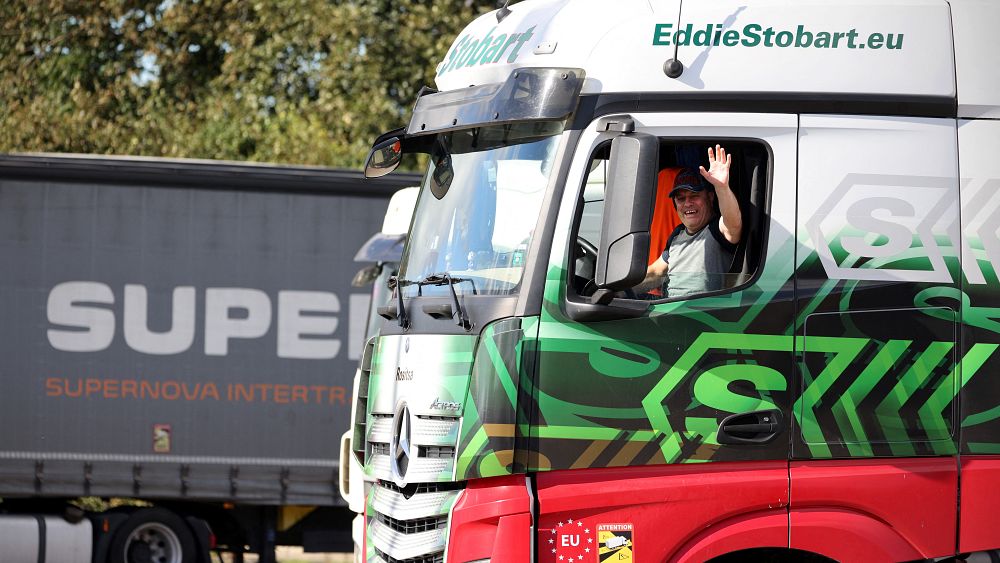
The British government is moving to ease the rules on the number of deliveries foreign lorry drivers can make in the UK, in an attempt to unblock the country’s supply chain logjam.
At the moment, EU hauliers can only pick up or drop off goods twice a week in the UK. Under the new proposals they will be able to do so unlimited times for a period of up to two weeks.
The government, which says thousands more deliveries could be made each month, is consulting the industry on its suggested changes which would take effect towards the end of the year.
A chronic lack of lorry drivers — the result of Brexit, the pandemic and other factors — has brought fuel shortages, empty supermarket shelves, and goods being clogged up at the UK’s busiest container port of Felixstowe.
In recent weeks the government has moved to grant temporary visas for up to 5,000 overseas lorry drivers, extending their duration until the end of February.
But on Friday Transport Minister Grant Shapps admitted that only dozens of visas had been taken up.
The latest move is the 25th to help ease the shortage of lorry drivers, he said, stressing its temporary nature. “The long-term answer to the supply chain issues we’re currently experiencing must be developing a high-skill, high-wage economy here in the UK,” he said.
But strongly criticising the new proposals, the UK Road Haulage Association (RHA) argued they would have the opposite effect, undercutting UK hauliers.
“We will have thousands of lorries operating in the UK paying no tax, no fuel duty, drivers below min wage. I get it’s a crisis, but this is the worst option,” the RHA’s Policy Director Duncan Buchanan said on Twitter.
The industry body has called on the government to amend rules requiring drivers to complete at least 35 hours training every five years, which it argues has deterred UK drivers who have left the profession from returning.
EU rules entitle lorry drivers to perform up to three operations within a seven-day period under the so-called “cabotage” system. This allows hauliers to operate in different member states, to improve efficiency and reduce the number of trips where lorries are empty.
But the UK left the scheme under Brexit, limiting EU trucks’ ability and incentive to operate in Britain.
Edwin Atema of the European drivers’ union the FNV said the UK’s move to ease its cabotage rules would be “legalising exploitation”, and “pour oil on the fire of an industry that is broken at the moment”.
Far from raising pay and conditions, he said Britain would now be encouraging the opposite.
“This same government puts UK suppliers in competition with ‘clown’ companies,” he told BBC Radio. “I say ‘clown’ companies because the companies who will operate in the UK if these rules are lifted will not be companies from Belgium, the Netherlands, Belgium or France. These will be companies from countries such as Lithuania and Romania,” where he said employers were lobbying to lower standards.
THE ROTTEN FISH: CAN OF WORMS OPENED OF APC & TINUBU'S GOVERNMENT OVER NIGERIA'S ECONOMIC DOWNTURN
WATCH THE CRITICAL ANALYSIS AND KNOW THE RESPONSIBLE PARTIES TO BLAME FOR NIGERIA'S ECONOMIC CHALLENGES, WHILE CITIZENS ENDURE SEVERE HARDSHIPS.Watch this episode of ISSUES IN THE NEWS on 9News Nigeria featuring Peter Obi's Special Adviser, Dr Katch Ononuju, 9News Nigeria Publisher, Obinna Ejianya and Tinubu Support Group Leader, McHezekiah Eherechi
The economic crisis and hardship in Nigeria are parts of the discussion.
Watch, leave your comments, and share to create more awareness on this issue.
#9NewsNigeria #Nigeria #issuesInTheNews #politics #tinubu THE ROTTEN FISH: CAN OF WORMS OPENED ...
DON'T FORGET TO SUBSCRIBE AND LEAVE YOUR COMMENTS FOR SUBSEQUENT UPDATES
#9newsnigeria #economia #economy #nigeria #government @9newsng
www.9newsng.com
